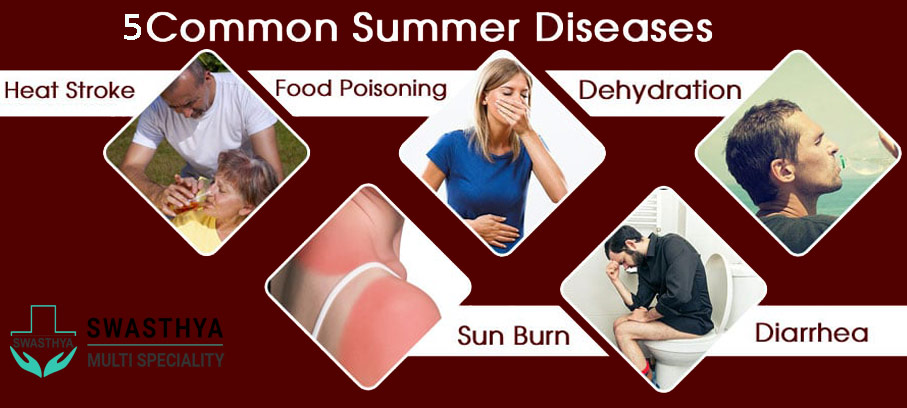5 Common Summer Season Diseases and How to Prevent Them
The summer season brings warmth, sunshine, and the opportunity for outdoor fun. However, the heat and humidity also create the perfect environment for various diseases. From dehydration to mosquito-borne illnesses, the summer months can pose health risks if precautions are not taken. Here are five common summer season diseases and tips on how to prevent them.
1. Heat Stroke
One of the most severe conditions associated with hot weather is heat stroke. It occurs when the body overheats, often due to prolonged exposure to or physical exertion in high temperatures. Heat stroke can lead to damage to the brain, heart, kidneys, and muscles if not addressed immediately.
Symptoms:
- High body temperature (above 103°F or 39.4°C)
- Rapid pulse and breathing
- Dizziness or fainting
- Confusion or irritability
- Nausea or vomiting
Prevention Tips:
- Stay Hydrated: Drink plenty of water, even if you’re not feeling thirsty. Avoid sugary, caffeinated, or alcoholic beverages as they can dehydrate you.
- Wear Light Clothing: Opt for lightweight, loose-fitting, and light-colored clothing to allow your body to cool more easily.
- Limit Outdoor Activities: Avoid physical activity during the hottest parts of the day (typically between 10 a.m. and 4 p.m.).
- Take Cool Breaks: If you’re outdoors, take regular breaks in the shade or in air-conditioned environments.
2. Dehydration
Dehydration happens when the body loses more fluids than it takes in, which can happen rapidly in hot weather. It can range from mild to severe, and in extreme cases, it can lead to serious complications like kidney failure.
Symptoms:
- Thirst
- Dry mouth or skin
- Fatigue
- Dark-colored urine
- Dizziness
Prevention Tips:
- Drink Water Regularly: Aim to drink at least 8-10 glasses of water daily, and more if you’re physically active or spending time in the sun.
- Eat Hydrating Foods: Include fruits and vegetables like watermelon, cucumbers, and oranges that have high water content.
- Avoid Dehydrating Drinks: Steer clear of excessive consumption of coffee, tea, and alcohol, as they can contribute to fluid loss.
3. Food Poisoning
Summer heat can cause food to spoil more quickly, leading to food poisoning if proper care isn’t taken. Barbecues, picnics, and outdoor events are prime occasions for foodborne bacteria to thrive, such as Salmonella and E. coli.
Symptoms:
- Nausea and vomiting
- Diarrhea
- Abdominal cramps
- Fever
Prevention Tips:
- Proper Food Storage: Store perishable foods like meats, dairy, and seafood in coolers with ice or refrigerate them as soon as possible.
- Cook Thoroughly: Ensure that meat is cooked to the right temperature (use a meat thermometer) and avoid cross-contamination between raw and cooked foods.
- Clean Hands and Surfaces: Wash hands before handling food, and sanitize surfaces and utensils that come into contact with raw food.
4. Sunburn and Skin Infections
Excessive sun exposure can lead to painful sunburns, while hot and humid conditions can cause skin infections such as fungal infections, prickly heat, and rashes.
Symptoms (sunburn):
- Red, painful skin
- Blisters in severe cases
- Peeling skin
Prevention Tips:
- Apply Sunscreen: Use a broad-spectrum sunscreen with SPF 30 or higher and reapply every two hours, especially after swimming or sweating.
- Wear Protective Clothing: Cover up with hats, sunglasses, and long sleeves when spending extended periods in the sun.
- Keep Skin Clean and Dry: After sweating or swimming, take a shower to prevent fungal infections and change into dry clothes to avoid heat rashes.
5. Diarrhea
Diarrhea is a common illness during the summer season, often caused by consuming contaminated food or water. Hot and humid weather creates ideal conditions for bacteria, viruses, and parasites to thrive, increasing the risk of foodborne illnesses. Travelers and people attending outdoor events like picnics or barbecues are particularly susceptible to diarrhea, as food can spoil quickly when left out in warm temperatures.
Symptoms:
- Frequent loose or watery stools
- Abdominal cramps
- Nausea and vomiting
- Fever
- Dehydration
Prevention Tips:
- Practice Good Hygiene: Wash hands with soap and water before handling food, after using the restroom, and after outdoor activities. Use hand sanitizers when soap and water are not available.
- Safe Food Handling: Refrigerate perishable foods and cook meats to the appropriate internal temperatures to prevent bacterial growth. Avoid consuming raw or undercooked meats, seafood, or eggs.
- Drink Clean Water: Always drink water from safe, reliable sources. When traveling to areas with unsafe drinking water, use bottled or boiled water. Avoid consuming ice made from untreated water.
- Avoid Street Food: Be cautious when consuming street food or food from outdoor vendors, especially in unfamiliar regions. Ensure that food is cooked thoroughly and served hot.
- Refrigerate Leftovers Promptly: Do not leave food out in the open for extended periods, especially in hot temperatures. Refrigerate leftovers within two hours to prevent bacterial contamination.
Conclusion
While the summer season offers many enjoyable activities, it’s important to be mindful of the associated health risks. By staying hydrated, protecting your skin, and taking preventive measures against foodborne diseases, you can ensure that you have a safe and healthy summer. Prevention is always better than cure, so stay vigilant and take proactive steps to protect yourself and your loved ones from these common summer ailments.


